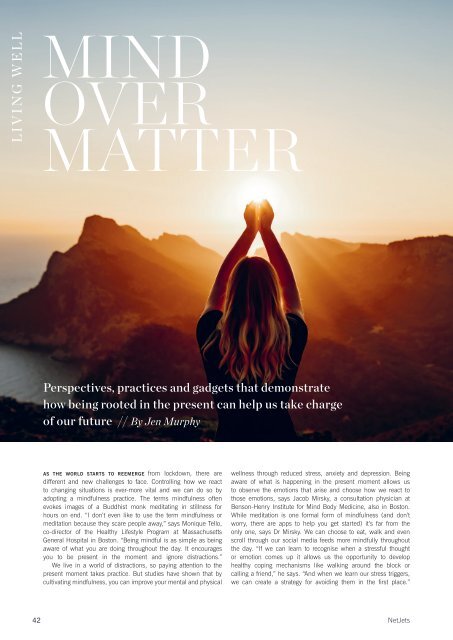You also want an ePaper? Increase the reach of your titles
YUMPU automatically turns print PDFs into web optimized ePapers that Google loves.
LIVING WELL<br />
MIND<br />
OVER<br />
MATTER<br />
Perspectives, practices and gadgets that demonstrate<br />
how being rooted in the present can help us take charge<br />
of our future // By Jen Murphy<br />
AS THE WORLD STARTS TO REEMERGE from lockdown, there are<br />
different and new challenges to face. Controlling how we react<br />
to changing situations is ever-more vital and we can do so by<br />
adopting a mindfulness practice. The terms mindfulness often<br />
evokes images of a Buddhist monk meditating in stillness for<br />
hours on end. “I don’t even like to use the term mindfulness or<br />
meditation because they scare people away,” says Monique Tello,<br />
co-director of the Healthy Lifestyle Program at Massachusetts<br />
General Hospital in Boston. “Being mindful is as simple as being<br />
aware of what you are doing throughout the day. It encourages<br />
you to be present in the moment and ignore distractions.”<br />
We live in a world of distractions, so paying attention to the<br />
present moment takes practice. But studies have shown that by<br />
cultivating mindfulness, you can improve your mental and physical<br />
wellness through reduced stress, anxiety and depression. Being<br />
aware of what is happening in the present moment allows us<br />
to observe the emotions that arise and choose how we react to<br />
those emotions, says Jacob Mirsky, a consultation physician at<br />
Benson-Henry Institute for Mind Body Medicine, also in Boston.<br />
While meditation is one formal form of mindfulness (and don’t<br />
worry, there are apps to help you get started) it’s far from the<br />
only one, says Dr Mirsky. We can choose to eat, walk and even<br />
scroll through our social media feeds more mindfully throughout<br />
the day. “If we can learn to recognise when a stressful thought<br />
or emotion comes up it allows us the opportunity to develop<br />
healthy coping mechanisms like walking around the block or<br />
calling a friend,” he says. “And when we learn our stress triggers,<br />
we can create a strategy for avoiding them in the first place.”<br />
42 NetJets


















